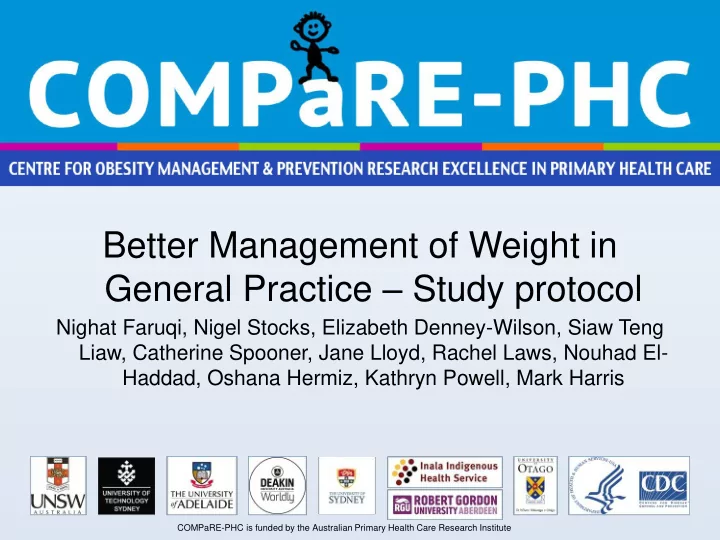

Better Management of Weight in General Practice – Study protocol Nighat Faruqi, Nigel Stocks, Elizabeth Denney-Wilson, Siaw Teng Liaw, Catherine Spooner, Jane Lloyd, Rachel Laws, Nouhad El- Haddad, Oshana Hermiz, Kathryn Powell, Mark Harris COMPaRE-PHC is funded by the Australian Primary Health Care Research Institute
• The majority of Australians are overweight or obese • Socioeconomically disadvantaged groups have: – higher rates of obesity – higher burden of chronic disease – Lower general literacy – Lower health literacy
“Health literacy is the degree to which individuals have the capacity to obtain, process and understand basic health information and services needed to make appropriate health decisions.” Institute of Medicine Low health literacy affects: • Access and use of healthcare • Patient-provider interaction • Self-management of health
1. NHMRC Clinical Practice Guidelines for the Management of overweight and obesity in adults, adolescents and children in Australia , 2013 2. The evidence- based ‘5As’ framework: – Assess – Advise – Agree – Assist – Arrange
AGREE ASSESS ASSIST ADVISE ARRANGE Risks. Realistic Referral to Lifestyle Follow up tailored Readiness community changes visits to change goal setting programs
To evaluate the implementation and effectiveness of Prevention Navigators in the provision of weight management to obese patients with low health literacy attending general practice leading to improvements in patients’ health literacy for weight loss
• Prevention Navigators will show improvement in: – self-reported behaviour and confidence in assessing obese patients with low health literacy and – providing advice and referral • Obese patients with low health literacy are more likely to report having – received assessment, advice and referral and – attended community-based weight management lifestyle modification programs • Obese patients with low health literacy are more likely to have improved their health literacy related to weight loss
Design: A pragmatic cluster randomised trial Timeline: Six-month intervention Practices: 20 practices in socioeconomically deprived areas 10 each in Sydney and Adelaide A minimum of one general practitioner and practice nurse will be enrolled / practice One practice nurse from each intervention practice will be trained as Prevention Navigator
• Very few patients get referred to weight management programs • Patients with low health literacy find it difficult to navigate services We will train Practice Nurses as Prevention Navigators to: • boost referral rates • help patients navigate the community-based lifestyle modification program referral system
1.Clinical Audits 2.Education for GPs and practice nurses 3.Health checks by Prevention Navigators (follow the ‘5As’)
• 40 – 70 years of age • BMI ≥30 • Low health literacy • Visited a participating GP at least once in the last 12 months
1.How often do you have someone help you read health information materials? Never Occasionally Sometimes Often Always 2. How often do you have problems learning about your medical condition because of difficulty understanding health information materials? Never Occasionally Sometimes Often Always 3. How confident are you filling in medical forms by yourself? Extremely Quite a bit Somewhat A little bit Not at all Chew LD et al (2004). Brief questions to identify patients with inadequate health literacy. Family Medicine 36 , 588 – 594.
• Clinical heart disease • Stroke • Insulin-treated diabetes • Chronic renal impairment (eGFR < 60 mls/minute/1.73m 2 ) • Current treatment with a weight loss medication (orlistat or phentermine), and • Previous or planned bariatric surgery in the next 12 months.
Assess Advise Agree Assist Arrange Prevention Follow up GP assess Screening for low Navigator health telephone call patient for health literacy in check visit and GP visits eligibility and waiting room (Intervention (Intervention enrollment group) group)
DATA SURVEYS INTERVIEWS ANTHROPOMETRY LINKAGE GPs PNs Patients
• On an Intention to treat basis
• Exploring a new role for practice nurses as Prevention Navigators in general practice • Improvements in referrals to lifestyle modification programs and attendance
This Study is supported by a grant from the Australian Primary Health Care Research Institute which is supported by a grant from the Australian Government Department of Health and Ageing. APHCRI is not involved in the study design or implementation.
Thank you
• Obese patients with low health literacy are, at 12 months, more likely to have (i) increased intake of dietary portions of fruit and vegetables / day and minutes of moderate and/or vigorous intensity physical activity / week (ii) reduced consumption of high fat food / day and hours of sedentary activity / day and (iii) moderated alcohol consumption. • Obese patients with low health literacy are, at 12 months, more likely to have (i) reduced their baseline weight by 5% or maintained it and (ii) improved their health-related quality of life. • The total cost of health service use of patients in the intervention and control practices will not be different. • GPs will demonstrate greater improvement in their self-reported behaviour and confidence in assessing obese patients with low health literacy and providing advice and referral to them for weight loss.
Primary • PN self-reported behaviour and confidence in assessing obese patients with low health literacy and providing advice and referral. • Patients’ report, in past 6 months, of receiving assessment, advice and referral for weight loss and attending/using referrals. • Patient health literacy related to weight loss. Secondary • Patient self-reported (i) intake of dietary portions of fruit and vegetables / day (ii) use of high fat food (iii) consumption of alcohol and (iv) minutes of moderate and/or vigorous intensity PA / week • Measured weight • Health-related quality of life • The total cost of health service use
Recommend
More recommend